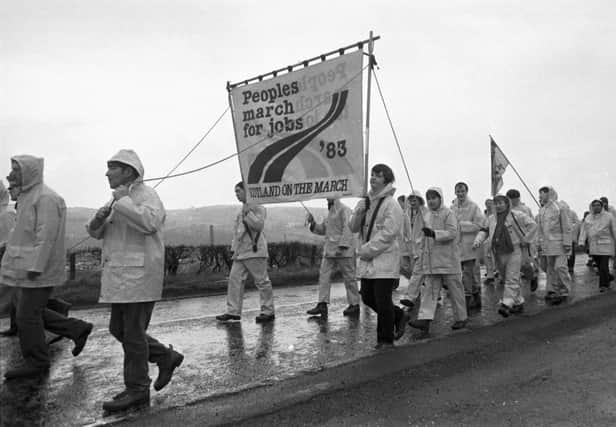Coronavirus economic crisis risks mass unemployment on much wider scale than 1980s – Kenny MacAskill


Job losses are mounting, and unemployment threatens to become a tidal wave. We’ve been through it in the 1980s with Thatcherism, but the coronavirus crisis threatens to be worse and the effects far wider.
It’s why the Chancellor must be bold. To be fair, his instincts appear better than the bluster of his Prime Minister. A modern FDR the latter most certainly isn’t and much more is needed to protect the economy and alleviate social harm. What Rishi Sunak has announced is a start, but it must go further.
Advertisement
Hide AdAdvertisement
Hide AdLike all my age, I lived through the mass redundancies that hit entire sectors and communities in the 1980s. It was frightening at one stage, leaving us wondering when it might all stop and just what might be left. Working in Glasgow at that time but living in West Lothian, I’d occasionally drive to work, and it was across a landscape pockmarked by devastation. British Leyland no more, Polkemmet Pit no more, Honeywell no more. Off in the distance Gartcosh, Caterpillar and, soon to join them, the leviathan of Ravenscraig, all to disappear into history.
Of course, as the Proclaimers song poignantly articulated, it wasn’t just entire sectors like coal mining or the manufacturing base that we’d prided ourselves on which disappeared. Entire communities were devastated. Bathgate no more, Linwood no more, Methil no more, far too many to be covered in the lyrics but they felt the pain all the same.
Some communities have recovered but others have not. Housing now occupies the place where British Leyland, and before it the BMC , were located. But most who live there will now work in Livingston or Edinburgh. The jobs have gone from the community. Other areas haven’t seen anything similar, instead enduring a slow social collapse as unemployment became the norm and social ills such as alcohol abuse, drugs or depression escalated.
That’s why we have to target unemployment – and fast, for it will be more widespread this time and harder for many to deal with. Back then, it tended to hit specific sectors. And not just those Scottish communities – counterparts in northern England and Wales were likewise afflicted. Pits, yards and factories took the hit, and especially the communities and towns that had grown around them over generations, and sometimes even centuries.
Other sectors, though, were entirely immune, and some, like financial services, positively flourished under deregulation. “Loadsamoney” culture may have been centred on the City of London but it existed almost everywhere. Leisure, retail and hospitality took off, even if the Co-ops and town centres in the forgotten lands struggled to stay open.
But what threatens with coronavirus is almost across the board, other than in IT and software development, along with essential services that remain come what may. Early casualties have been in hospitality, retail and leisure, as well as other sectors that had once been immune to the cull. A recovery will come but some laid off won’t be taken back, whilst others will find that the doors where they once worked have clanged shut forever, as they did 40 years ago for those factories.
Most back then were working class, but with our changed society and economy, this time it’ll be the middle class suffering just as much. Once-secure jobs and sectors gone, businesses that inviduals have given a lifetime to building up, crumbling under the fallout from the virus. It’s not just the company towns where the big factories dominated but everywhere now, including once-protected leafy housing estates – just as the virus itself showed relative wealth and comfort are no protection to its consequences.
Whilst it was a myth that you could follow Norman Tebbit’s advice and “get on yer bike”, work was often available, whether in Australia or the Gulf or just down south in London or Manchester. The postcodes of friends from that era testify to that. But redundancies now aren’t discriminating on address any more than social class. This is everywhere.
Advertisement
Hide AdAdvertisement
Hide AdCommunities then were also different from today. Council housing was still the tenure for many, the mass-discounted sell-off hadn’t begun or it was for those who were retired or in a secure job. That at least meant that mortgage arrears didn’t immediately mount, and homelessness threaten.
Now as the home-owning democracy has taken root, many are going to find the mortgage holder far less supportive than the council and alternative accommodation more difficult to find.
It’s for that reason that keeping folk in work and getting them back to it are essential. There are caveats, as the former American Labor Secretary Robert Reich recently argued. Some ailing industries can’t be saved, but neither should they be culled as ruthlessly as coal was. Much more needs done to tackle unemployment, for all our sakes.
Kenny MacAskill is the SNP MP for East Lothian
A message from the Editor:
Thank you for reading this article on our website. While I have your attention, I also have an important request to make of you.
With the coronavirus lockdown having a major impact on many of our advertisers - and consequently the revenue we receive - we are more reliant than ever on you taking out a digital subscription.
Subscribe to scotsman.com and enjoy unlimited access to Scottish news and information online and on our app. With a digital subscription, you can read more than 5 articles, see fewer ads, enjoy faster load times, and get access to exclusive newsletters and content. Visit www.scotsman.com/subscriptions now to sign up.
Our journalism costs money and we rely on advertising, print and digital revenues to help to support them. By supporting us, we are able to support you in providing trusted, fact-checked content for this website.
Joy Yates
Editorial Director
Comments
Want to join the conversation? Please or to comment on this article.